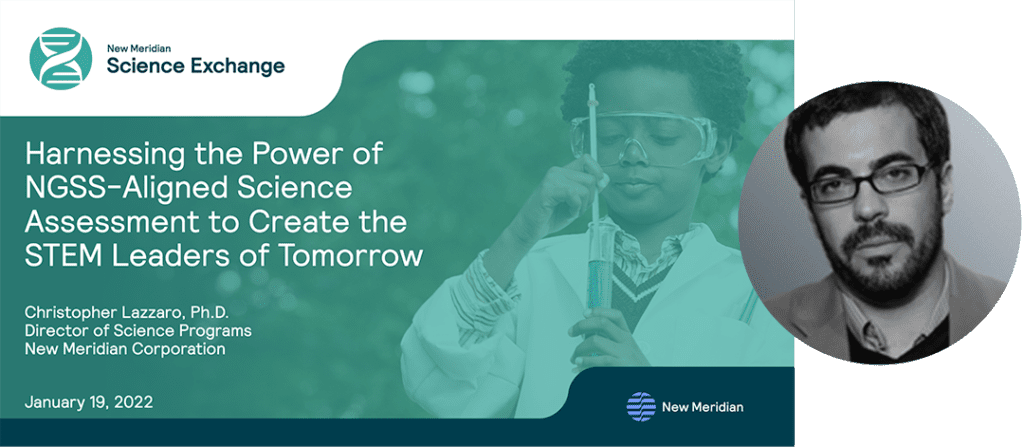
The nationwide shift to Next Generation Science Standards (NGSS) cannot be accomplished with curriculum and professional development alone, says Chris Lazzaro, New Meridian’s science director.
It must also include high-quality assessment aligned to those standards as part of a systemwide approach to ensure science education means more than just rote memorization and recall.
“Science isn’t just a body of knowledge,” he said. “It is a way of thinking. It’s a set of tools that you can use to approach any new problem that you might come across.”
Lazzaro spoke at Education Week’s virtual K-12 Essentials Forum, Teaching Science Today: Challenges and Solutions in January. In a session titled “Harnessing the Power of NGSS-Aligned Science Assessment to Create the STEM Leaders of Tomorrow” (see video below), Lazzaro explained how assessment plays an important role as states lean into the new standards.
“I would argue that the assessment component does need to be figured out,” Lazzaro said. “We are not going to sit here and advocate for the traditional standardized tests. We really do want to see … assessments that are more authentic.”
A Framework for Science Assessment
To that end, Lazzaro points to the Framework for Quality Review of NGSS Science Assessment Items, which New Meridian developed last year to help states review and evaluate test items and define high-quality assessments.
Lazzaro and his team also launched the New Meridian Science Exchange, which provides states with simple and cost-effective access to high-quality assessment items aligned to NGSS. The exchange allows states flexible options such as drawing from a bank of test items to create NGSS-aligned assessments or contributing items to the bank.
Together, the Framework and the Exchange represent tools states can use to facilitate a systemwide embrace of Next Generation Science Standards.
“A lot of states have been trying to create high-quality science content and science assessment,” Lazzaro said. “One of the problems in our very decentralized system is that we’re not all connected in ways that might make sense. One thing that we’re trying to do at New Meridian is make those connections. We’re trying to actually provide a common marketplace where states can come together.”
The framework, which New Meridian publicly released in 2021, explains how to evaluate content on NGSS-aligned science assessments in terms of multi-dimensional performance, scenario quality, cognitive complexity and other metrics—including how high-quality test items can help increase equity.
The key, Lazzaro says, is to create assessments that engage students with material that is relatable to their everyday lives.
“For example, a really bad question would be, ‘how many protons are in hydrogen?’” he said. “That’s just a terrible assessment question. It doesn’t really give us very much data about what the students know or don’t know. I can ask Siri how many protons are in hydrogen and she’ll tell me in a second. So that’s not really something I need to know in order to be scientifically literate.”
More appropriate, Lazzaro said, might be questions around hydrogen’s position as the lead element on the Periodic Table. “That,” he said, “is much more scientific in nature.”


